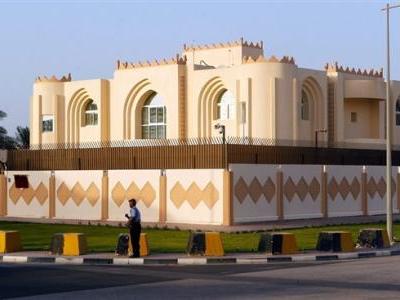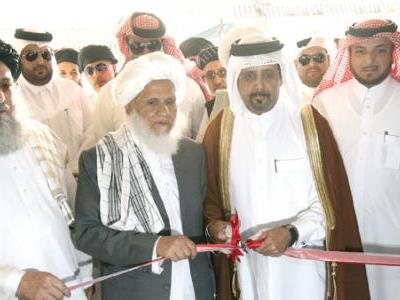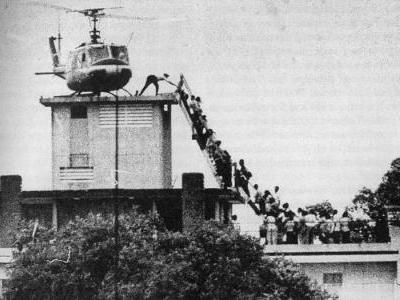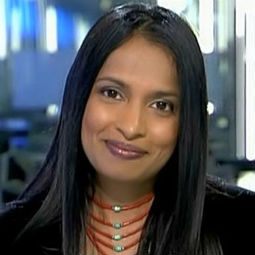Riding the ‘talking to the Taliban’ train, with the brakes jammed
No surprises. There were no Taliban talks on Thursday.
Just a day after Tuesday’s grand opening of the rather kitschy Taliban office in the upscale West Bay district of Doha, Qatar, Afghan President Hamid Karzai announced there would be no official Afghan delegation at Thursday’s talks.

The announcement put the spin cycle in overdrive as experts and journalists dissected the “extraordinary mismanagement” of the latest “historic opportunity”. Many of these experts have been pushing this "talking to the Taliban" strategy and many of these journalists have uncritically reported it, but never mind. When policies that are doomed to fail do indeed start to fail, there’s always someone to blame.
Shortly after the talks-suspension announcement, we were subjected to a media-friendly fuss over flags and names and other minutiae.
Karzai, quite understandably, objected to the Taliban office in Doha being called the “Political Office of the Islamic Emirate of Afghanistan” and the hoisting of the old Taliban flag on the faux Gulf palace structure.
The offending flags and plaques have since been brought down because the US is good at arm-twisting design concessions from offending parties.
The crux of the problem however remains and so, in the next few days and weeks, expect more “scrambling to save the talks” headlines followed by on-again off-again updates. We’ve seen these sorts of headlines for years, but again, never mind, the ribbon across the Doha office has been cut under the international media spotlight so somehow this time, it’s different.

USA, Qatar, Pakistan play ball on the ‘playground of empires’
One of the critiques of the current negotiations has been the failure to learn the lessons of the past – such as the doomed late-1990s negotiations while the Taliban was mismanaging large swathes of the country.
When it comes to Afghanistan, history has always loomed large in the public imagination. I’ve never been a fan of these “Afghanistan as graveyard of empires” metaphors simply because there are a host of contextual details that make the British colonial period quite different from the Soviet occupation or the post-Soviet mujahideen wars or the US-led military intervention.
But if there’s one historic grouse we should heed, it’s the longstanding Afghan complaint that their country is not so much a “graveyard” as a “playground” of empires.
That’s the real reason for Karzai’s ire, as Afghan officials clearly stated Wednesday: the US - aided by the Qataris and in cooperation with the Pakistanis - is driving the agenda to determine the future of Afghanistan.
The US has a history of “bringing enemies to the table” before it turns tail and flees disastrous military interventions of course.
More than 40 years ago, Henry Kissinger brought North and South Vietnamese officials to the table to try to hammer out “a deal” that would enable US troops to get the hell out of Vietnam. Two years after the 1973 Paris Peace Accords were signed, North Vietnamese forces drove into Saigon, captured the city, and the world watched that iconic footage of US Embassy staffers scrambling onto a helicopter on the US embassy building in Saigon.

In the Af-Pak region, Washington has a rich history of making deals with right-wing religious/Islamist nut-jobs. In the old Cold War days, it meant shoveling billions of dollars (and Stinger missiles) – via Pakistan and Saudi Arabia – to the likes of Gulbuddin Hekmatyar and Jalaluddin Haqqani. These two mujahid granddaddies are still apparently part of the Taliban – depending on who you ask – and no one ever seems to know if they’re in – or not - with this latest Doha bling thing.
Back in 1979, we did not know that we were spawning monsters that would come back to bite us. We were busy turning Afghanistan into the graveyard of the Soviet empire and the god-loving jihadists were the best bet against the god-hating communists.
But the Cold War is over. So why are we dealing with – and funding - these Islamist hardliners when the Arab World, as we speak, is in the throes of a hotly-contested debate between political Islam and secularism?
The answer is a long, complex one, but I’m going to try to simplify it right here, right now, in one word: shortsightedness.
Karzai gets high on the High Peace Council
Almost 12 years after the Taliban was ousted, Afghanistan is not, contrary to all those alarming news reports, the hopeless, isolated, impoverished, dust-and-rubble-strewn wasteland it had turned into under the Taliban.
It’s not Switzerland of course and there are plenty of problems such as violence, poverty and corruption.
But it’s not what it used to be and if I have one enduring regret after more than a decade of covering Afghanistan, it’s the fact that my reports – like many of my colleagues’ – have failed to paint a picture of the outstanding Afghan progress in building civil society institutions and women’s rights initiatives and generating economic opportunities.
Afghans themselves are no longer the subdued cowering bunch we saw on smuggled videos from the Taliban era. Almost 70% of the population is under 25 and have little or no experience of, nor patience for, the Taliban vision of their country.
As for the Afghans who have experienced Taliban rule, many of them have been warning that the hardline Islamists and their supporters in Pakistan could undermine these hard-fought gains. They have publicly cautioned the Karzai administration against hasty decisions or short-term deals with the Taliban.
Enough column space and airtime has been spent lambasting Karzai so I’m not going into details on this one here. I have to say though, about three years ago, I seriously wondered if the Kabul rumor mill about the Afghan president’s drug addiction problem might be right. In 2010, when he launched the aptly-named High Peace Conference, it seemed like everyone in that country was as high as a kite on premium Afghan opium.
Over the past few years, there have been backdoor Taliban talks in fits and starts and I would give my eye teeth if I could be a fly on the wall during these proceedings.
One interesting account of these talks came from Afghan human rights activist Nader Naderi in the Wall Street Journal after the former AIHRC (Afghanistan Independent Human Rights Commission) chairman met a Taliban delegation in December 2012 in Chantilly, France.
For those who can’t access the entire piece, Naderi basically noted that, “The gap between the perceptions of the Taliban and the rest of the participants was stark. The Taliban representatives' remarks focused mainly on war, while the other participants talked of Afghanistan's democratic future rooted in the rule of law, elections and accountable government.”
But Karzai has not been listening – or listening with just one ear. He continued making erratic, inconsistent noises on this policy – one day reaching out to “our brethren” Taliban, the next day making noises about preconditions, the day after blaming Pakistan for supporting the Taliban, only to follow that with assurances that if Pakistan ever went to war with the US, he would back Islamabad. Ah, the gratitude for all those CIA cash brown bags.
Enter the ‘Great Game era political officer’
So our man in Kabul is mercurial, overwrought, long on emotional outbursts and short on long-term vision.
But it’s not just the Afghan political leadership that has been pushing the country into the Taliban’s Gulf-funded arms.
Whole battalions of non-Afghan experts, funded by the international bazaar of post-conflict initiatives and think-tanks, have jumped on this bandwagon over the past few years.
These include, notably, Michael Semple, an Irish expert on Afghanistan who worked for the EU mission in Afghanistan before he was expelled in December 2007 – along with a British UN political expert – for his involvement in “activities that were not consistent with their original jobs” and for “engaging in unauthorized activities”.
As a 2008 BBC piece noted, “unauthorized activities” in Afghan intelligence-speak means “running an extensive network of Taleban (sic) contacts”. The report quoted an unnamed Afghan secret service agent as noting that Semple was “behaving like a Great Game era political officer”.
Ouch! That’s a low blow. But the bearded, Dari-speaking, Afghan clothes-wearing Semple barely felt the punch. Almost five years later, he is a highly regarded expert in Afghan chattering circles and his gospel of bringing the Taliban in from the cold has gained wide currency.
This talking to the Taliban business has crept up on us imperceptibly – or as the latest ICSR (International Centre for the Study of Radicalization) report notes, it became official policy “by osmosis rather than deliberation and strategy”.
What seemed like a dumb idea from the start suddenly started receiving so much traction that over the years, I’ve seen activists initially opposed to the policy being forced to modify their tune since the talking train had already hit the rails with the brakes jammed.
Semple himself is so well regarded that for the longest time, I’ve dutifully considered his arguments, poring over his articles in respected periodicals such as Foreign Affairs as he discussed, “How to Talk to the Taliban” and “Flipping the Taliban”.
But after all these months - no make that years - of chasing and wooing and hosting and coaxing the Taliban, I think Michael Semple is simply flipping my brains.
This policy is not going to work, but that won’t stop us from expending a lot of money and time flogging this dead horse.
Finally, before I end, one last word on the frissons of excitement that accompany talking to the Taliban.
How do I know? Because I’ve been there and done that.
In the pre-9/11 days, when the Taliban was blasting Buddha statues, whipping women indoors and chopping limbs in a Sharia frenzy, I could earn a pat on my back from the editors if I managed to get the odd quote from a senior Taliban official on a crappy phone line routed from Islamabad to Kabul.
These Taliban guys say the same bullshit and they can give you a headache with their inconsistent opinions. But they’re so retrograde in an over-the-top sort of way that international news organizations can’t have enough of playing up their access to the Taliban.
In the next few days, expect many “exclusive” interviews with Taliban officials. The Associated Press already has an “exclusive telephone interview” with Taliban spokesman Shaheen Suhail from his Doha office. They’re sitting in Doha, for Christ’s sake, not staring at the Kabul moon. Of course Al Jazeera, the Qatar-based TV station will have a high season of Taliban exclusives. But the competition will catch up and very soon we’ll have exclusive Taliban quotes pouring out of our ears.
All told, there’s something sexy about talking to the Taliban. So what if nothing will come of it?




2 Comments
Post new comment